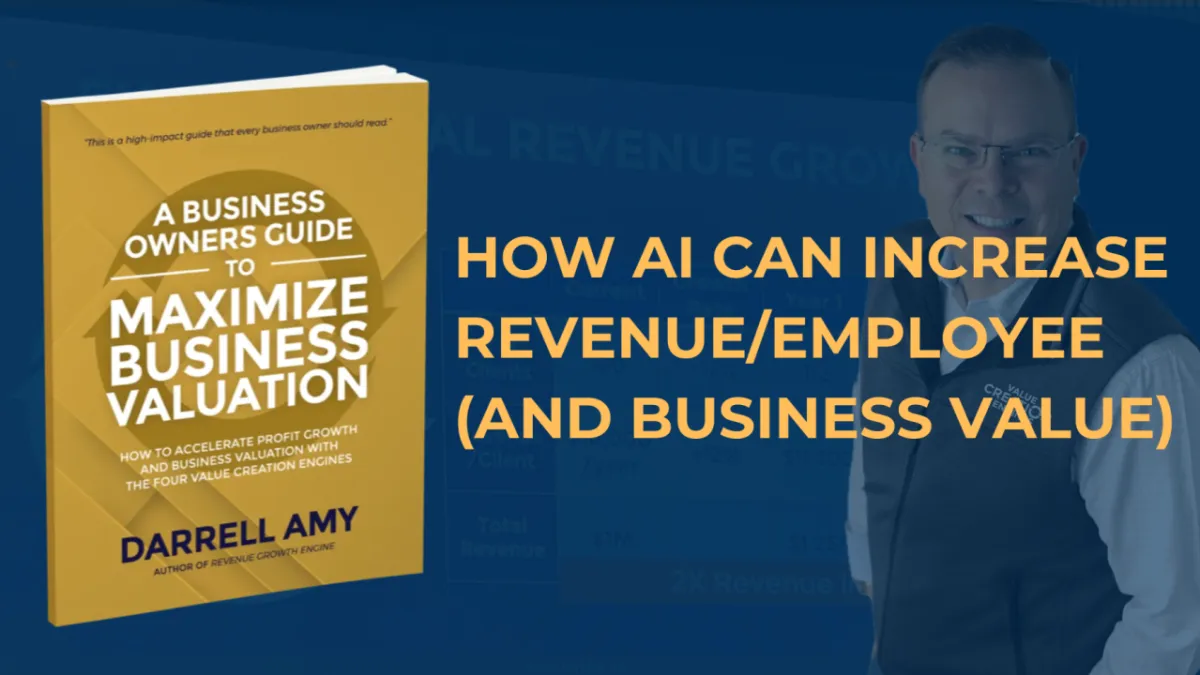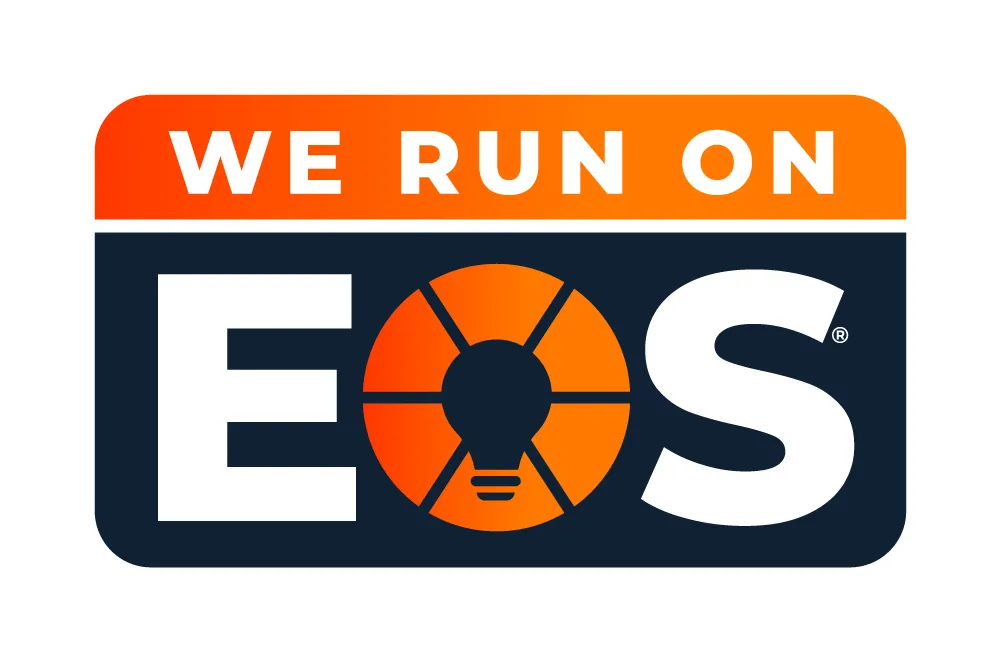
How AI Can Boost Revenue per Employee (and Business Value)
Revenue per Employee (RPE) is the #1 driver of profitability in most businesses. Since employees are the largest overhead expense, increasing the revenue generated per team member directly improves the bottom line. And higher profits fuel higher company valuations.
AI is a game-changer in this equation—automating repetitive tasks, enhancing decision-making, and enabling employees to focus on higher-value work. By leveraging AI to improve sales efficiency, streamline operations, and drive innovation, businesses can significantly increase their RPE and gain a competitive edge.
A recent study by Accenture found that AI has the potential to increase labor productivity by up to 40%, while McKinsey estimates that companies integrating AI into their business models can see a 15-20% improvement in EBITDA (Earnings Before Interest, Taxes, Depreciation, and Amortization)—a direct driver of company valuation.
We’ve had two years since Sam Altman gave us the 2022 Christmas present called ChatGPT. Initially, we treated it like a fun experiment—helping us draft emails, summarize reports, and brainstorm ideas. But AI is far more than a productivity boost; it's a fundamental shift in how we create value.
In the 1990s, the internet transformed business. In the 2000s, mobile and apps amplified that transformation. Today, we stand at the threshold of something even bigger.
AI is no longer just a toy—it’s a tool. And the companies that figure out how to use it effectively will gain a lasting competitive advantage. Midmarket businesses, in particular, are uniquely positioned to capitalize on AI. They have more agility than large enterprises—allowing them to implement and iterate quickly—while also having enough resources to scale successful AI initiatives. Unlike startups, they aren’t betting their entire future on AI but can use it strategically to outpace competitors and drive real value.
AI’s Potential to Improve Productivity and Profitability
The early data on AI’s impact is staggering:
AI can automate up to 30% of tasks in 60% of all jobs (McKinsey), enabling employees to shift focus to revenue-generating activities.
AI-assisted workers are 14% more productive on average, with some tasks seeing over a 50% efficiency boost (National Bureau of Economic Research).
Companies adopting AI-driven automation can see a 5-10% revenue increase and a 20-30% cost reduction (PwC), directly improving profitability and business value.
These numbers highlight the potential—but they don’t tell us exactly how to use AI for maximum impact. That’s the opportunity. We don’t know all the answers yet, but the companies that experiment, adapt, and innovate will define the next era of business and build a competitive advantage.
Four Ways AI Can Create Value
As I wrote in A Business Owner's Guide to Maximize Business Valuation, businesses create value through four key engines: Revenue Growth, Process Optimization, Culture Development, and Strategic Innovation. These engines determine how efficiently a company converts resources into profit, scalability, and ultimately, enterprise value.
AI has the potential to turbocharge each of these engines—enhancing revenue generation, streamlining operations, strengthening company culture, and driving innovation faster than ever before. The businesses that harness AI across these four areas will not only improve their Revenue per Employee but also build stronger, more valuable companies.
1. Revenue Growth
AI can supercharge revenue generation by making sales teams more efficient and automating core growth functions.
Improving sales productivity – AI-powered assistants can handle lead research, draft personalized outreach, automate follow-ups, and even generate full sales proposals—allowing sales teams to focus on closing deals.
Automating your Revenue Growth Engine – AI can analyze customer data, predict buying behavior, and trigger automated campaigns that convert leads faster.
Dynamic pricing optimization – AI can adjust pricing in real time based on demand, competitor actions, and customer behavior to maximize revenue.
Marketing campaign optimization – AI can continuously test and refine messaging, targeting, and ad spend, ensuring marketing budgets generate maximum ROI.
2. Process Optimization
Every business has repetitive tasks that slow things down. AI can eliminate inefficiencies, freeing employees to focus on higher-value work.
Automating repetitive processes – From data entry to report generation, AI-driven automation reduces manual workload and minimizes errors.
Enhancing decision-making – AI can analyze vast amounts of data instantly, giving leaders real-time insights to make better decisions faster.
Supply chain and logistics improvements – AI can predict inventory needs, optimize routes, and reduce delays, improving overall operational efficiency.
Process documentation and improvement – AI can automatically record workflows, identify bottlenecks, and suggest optimizations to improve efficiency.
3. Culture Development
A high-performing culture is the foundation of a great business. AI can help cultivate engagement, alignment, and continuous learning.
Personalized employee development – AI-driven learning platforms can recommend training tailored to each employee’s skills and career goals.
Improved internal communication – AI-powered chatbots and tools can streamline knowledge sharing and collaboration across teams.
AI-assisted hiring and talent retention – AI can help match candidates to roles more effectively, reducing turnover and improving workforce alignment.
Faster onboarding – AI can automate training sequences, answer new hire questions, and provide real-time coaching, helping employees become productive faster.
4. Strategic Innovation
Innovation isn't just about ideas—it’s about execution. AI can be a powerful thinking partner that helps organizations innovate faster and smarter.
A virtual co-pilot for your innovation team – AI can analyze trends, generate new ideas, and help refine business strategies.
Rapid prototyping and market testing – AI tools can simulate customer responses and test new concepts before investing heavily in development.
Uncovering new business models – AI can help identify untapped market opportunities and suggest innovative ways to monetize products and services.
Harness AI’s Potential to Increase Valuation
To turn AI from a novelty into a tool to increase the value of your company, follow these three steps:
Measure where you stand today – Track your Revenue per Employee and understand how AI-driven efficiency could improve it. (Start here.)
Develop a Value Creation Plan – Identify the areas where AI can create the most impact in your business.
Start a Value Creation Council – Assemble a cross-functional team to explore AI-driven opportunities, test new tools, and drive adoption across the organization.
The Bottom Line
AI isn’t just a cost-cutting tool—it’s a superpower for your Value Creation Engines.
Want to get started? Measure your Revenue per Employee and company valuation. Then build a Value Creation Plan today.
The future belongs to the bold. Will you be one of them?







